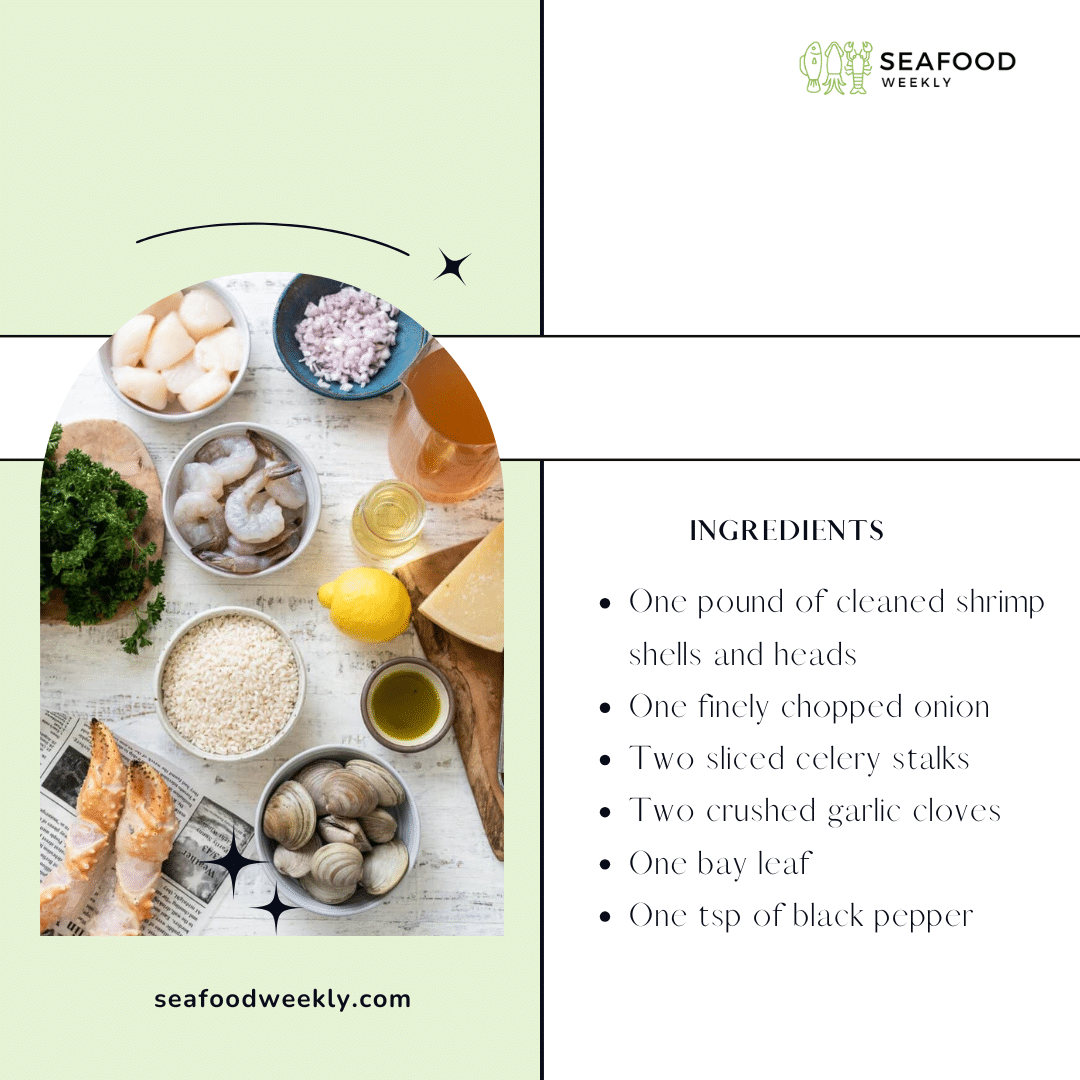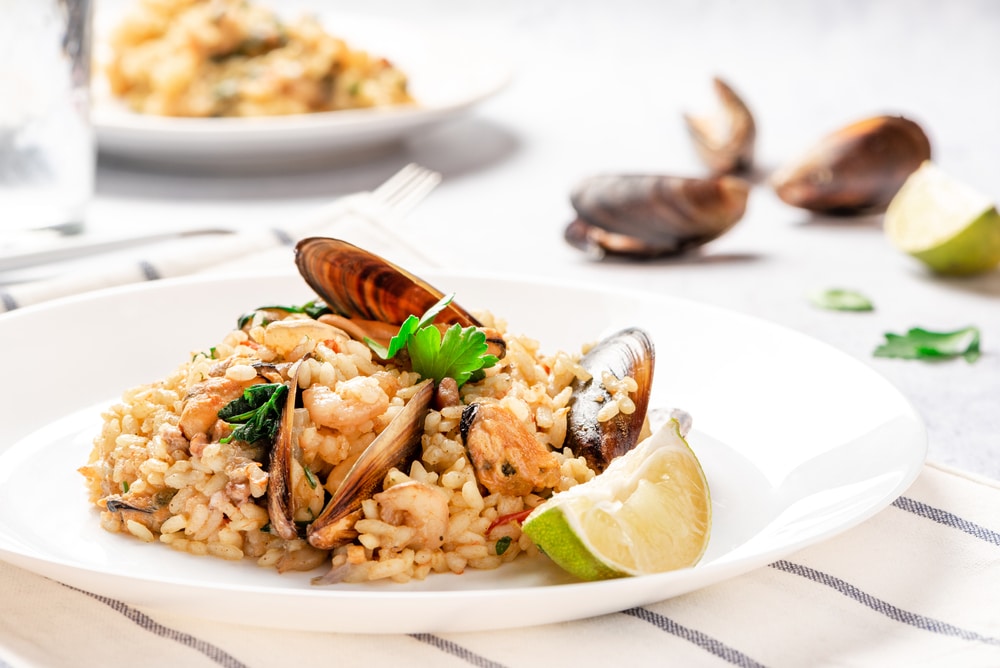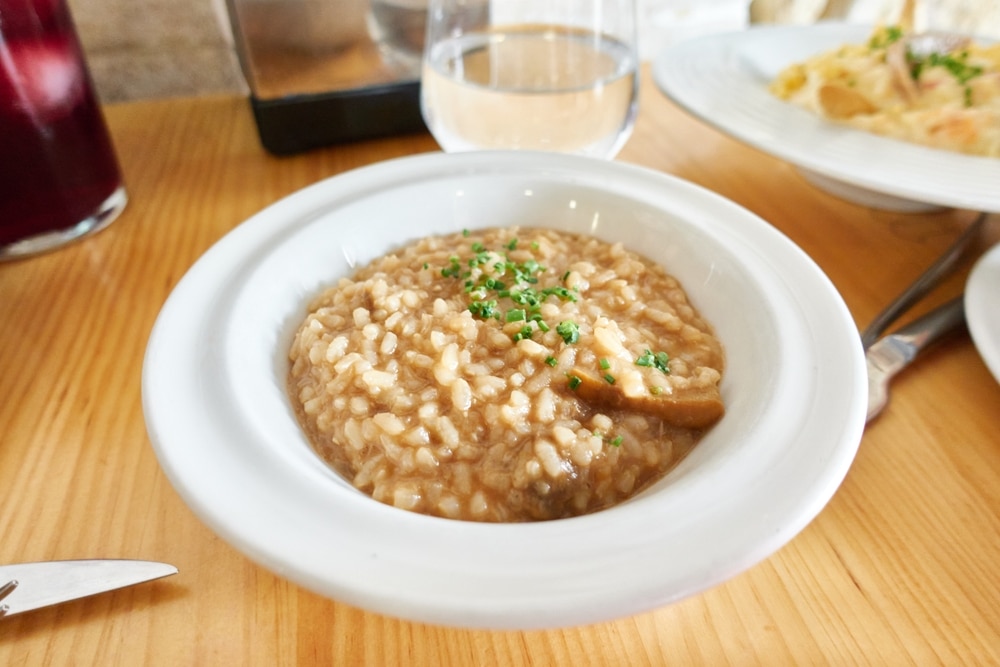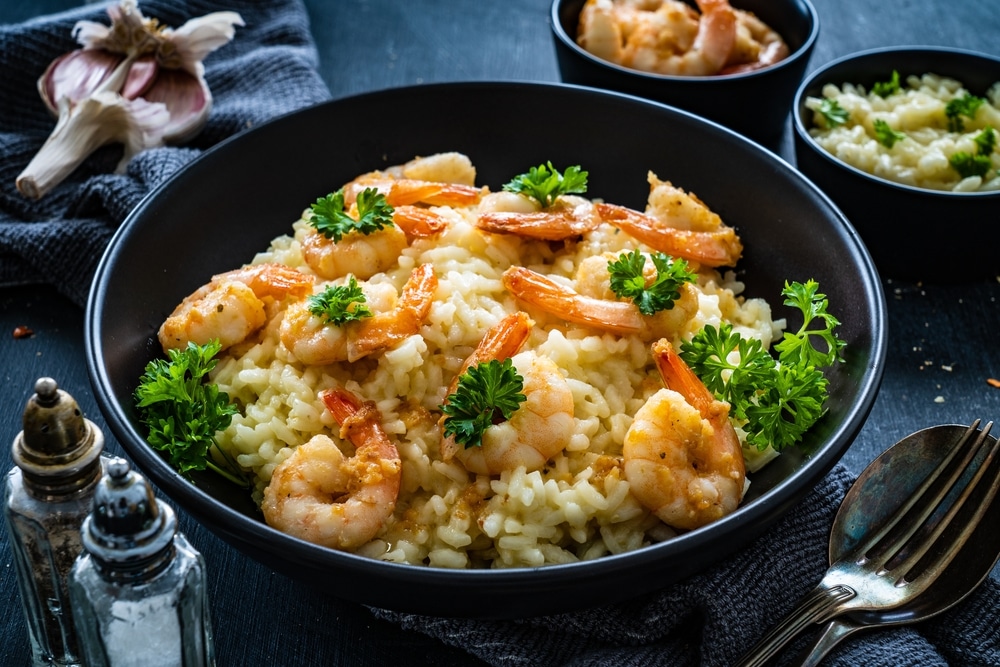Table of Contents
Italy’s known for its pizza, but let’s not forget about seafood risotto! Imagine creamy rice teamed up with the freshest seafood, pure magic on a plate. Thinking of it as a main course? Or simply an appetizer? No worries, risotto has got you covered. So, grab your ingredients, and let’s get cooking; it’s time to make a seafood risotto that’ll have everyone hooked!
Overview of Seafood Risotto
Folks and seafood aficionados must try the Italian seafood risotto. This is because it is such a blend of flavorful tastes that it will tantalize the tastebuds. A traditional Italian dish that is sumptuous and cozy is seafood risotto. Merging the creamy texture of Arborio rice with the fresh, saline flavors of seafood, it’s a meal that gives a touch of elegance to any dinner table. Seafood risotto is a great option for entertaining guests or making a special lunch for yourself.\
Ingredients for Seafood Risotto
 Below are the ingredients needed for the recipe for Italian seafood risotto:
Below are the ingredients needed for the recipe for Italian seafood risotto:
For the Seafood Stock
- One pound of cleaned shrimp shells and heads
- One finely chopped onion
- 2 sliced carrots
- Two sliced celery stalks
- Two crushed garlic cloves
- One bay leaf
- One tsp of black pepper
- Eight cups of water
For the Risotto
- 1 1/2 cups Arborio rice
- 1 pound of mixed seafood (shrimp, scallops, mussels, clams, and squid)
- One onion, diced finely
- Three minced garlic cloves
- Half a cup of dry white wine
- Four to five cups of warm seafood stock
- Grated Parmesan cheese, half a cup
- Two teaspoons each of butter and olive oil
- 1/4 cup freshly chopped parsley
- Salt and pepper to taste
- Lemon Wedges (for serving)
Instructions for Seafood Risotto
Get ready as you are about to get your hands on the best seafood risotto recipe.
Step 1: Prepare the Fish Sock
Although making your own seafood stock can seem like an unnecessary effort, the risotto benefits greatly from its rich, deep taste.
1. Cook the Shells
The first step to cooking creamy seafood risotto is cooking the shells. In a large pot, heat a little olive oil over medium heat. Add the shrimp heads and shells. Cook until flavorful and pink, stirring regularly. It should take five to seven minutes. The flavor-packed shrimp heads and shells will be the foundation of the stock.
2. Add Vegetables for Flavorful Seafood Risotto
Fill the large pot with the finely chopped onion, carrots, celery, and garlic. Simmer the veggies for five to seven minutes or until they are tender. These aromatics will give the stock additional depth and flavor.
3. Simmer
The next step in a risotto seafood dish is mixing everything. Mix the water, peppercorns, and bay leaf. After bringing to a boil, lower the heat and simmer for 30 to 40 minutes. The tastes of the veggies and shells will all be extracted throughout the simmering process, giving off a tasty and rich stock. This step is very important to master the seafood risotto recipe.
4. Strain the Stock for Seafood Risotto
Pour the stock into a clean pot by straining it through a fine mesh screen. Throw away the solids. Maintain the stock at a low temperature. Keeping the warm stock helps to keep the creamy texture of the risotto intact by ensuring that the Arborio rice absorbs it easily while cooking.
Step 2: Get the Seafood Ready
 Before adding the cooked seafood to the risotto, it should be cooked separately. This guarantees that the rice is cooked just right without overcooking any kind of seafood.
Before adding the cooked seafood to the risotto, it should be cooked separately. This guarantees that the rice is cooked just right without overcooking any kind of seafood.
1. Prepare the Seafood
In a separate, large pan, warm up a small amount of olive oil over medium-high heat. After adding the mixed seafood, cook it until it’s just done. The mussels and clams should be open, the shrimp should be pink and opaque, and the scallops should be firm and opaque. It ought to take five to seven minutes. Take out and place aside the cooked seafood. If a mussel or clam doesn’t open, throw it away since it’s unsafe for eating. You can also better control the texture of each variety of seafood by cooking it individually. You can become a pro at instant pot seafood risotto with our step-by-step guide.
Step 3: Make the Risotto
 Okay, so my saffron seafood risotto aficionados, you should know that risotto takes patience and careful attention to detail. The secret is to add the seafood stock gradually while stirring nonstop to help break down the starch in the rice and give it a creamy texture.
Okay, so my saffron seafood risotto aficionados, you should know that risotto takes patience and careful attention to detail. The secret is to add the seafood stock gradually while stirring nonstop to help break down the starch in the rice and give it a creamy texture.
1. Garlic and Onion Sauté
Heat one tablespoon of butter and the olive oil in a big pan over medium heat. When the onion is transparent, add the finely chopped onion and simmer. This should take five minutes or so. Cook for a further one to two minutes after adding the minced garlic. The risotto’s taste comes mainly from the onion and garlic.
2. Toast the Rice for Savory Seafood Risotto
Place the Arborio rice in the pan. Cook for two to three minutes, stirring frequently, or until the rice is lightly toasted. In addition to adding a subtle nutty flavor, toasting the rice helps it retain its starch.
3. Deglaze Seafood Risotto with Wine
Add the white wine and stir continuously until the rice absorbs all of the wine. The risotto gains acidity and flavor depth from this deglazing process.
4. Add Stock to your Seafood Risotto
Start ladling ladlefuls of the heated seafood stock into the rice. Constantly stir and wait for each ladleful of stock to absorb completely before adding another. Continue cooking for another 18 to 20 minutes or until the rice is creamy and al dente. The creamy texture of risotto is a result of the rice’s starches being released by the continuous stirring.
5. Add Seafood
Toss in the cooked seafood and reheat for a further two to three minutes. The seafood will stay soft and tasty if it is added at the very end.
6. Wrap up with Cheese and Butter
Take the pan off of the burner and mix in the grated Parmesan cheese and the last tablespoon of butter. Mix the cheese and butter thoroughly. This last stage improves the risotto’s creamy texture and adds richness.
7. Season Your Seafood Risotto
Now, it’s time to add the salt and pepper. Because the seafood stock and Parmesan cheese can be very seasoned, make sure to taste the risotto before adding salt. You are about to serve the best seafood and saffron risotto.
Step 4: Time to Serve the Seafood Risotto
 Risotto tastes best when it’s hot and creamy, so serve it right away.
Risotto tastes best when it’s hot and creamy, so serve it right away.
- Garnish: Add finely chopped fresh parsley to the risotto. The parsley offers a fresh, herbaceous accent that complements the rich flavors of the shrimp and risotto.
- Serve: Serve right away with lemon wedges. Squeezing some fresh lemon juice into the risotto balances its richness and provides brightness.
Among all variations of seafood risotto recipes, this one is the easiest and creamiest. Just lock the lid of your pressure cooker and get ready to savor some real goodness.
It is pertinent to mention that you can always go for specific seafood, such as shrimp, to make your ideal dish. You can check out the detailed recipe for shrimp risotto in this article.
Suggestions for Pairing Seafood Risotto
A wide range of wines and side dishes go well with risotto.
- Wine: A crisp, dry white wine such as a light Chardonnay, Pinot Grigio, or Sauvignon Blanc enhances the flavors of the fish without taking center stage.
- Salad: To balance the rich, creamy risotto, a simple green salad dressed with a light vinaigrette can be a welcome change of pace.
- Bread: To soak up any leftover sauce, serve with crusty bread or garlic bread.
Conclusion
Wrapping up, I understand that making a restaurant-worthy seafood risotto at home might seem difficult, but with this comprehensive recipe and a little dedication, you can pull it off. The secret is to prepare a tasty seafood stock, use fresh ingredients, and pay close attention to the risotto while it cooks. The final dish is a delicious, creamy meal that emphasizes the best parts of the sea. Savor each and every taste of this classic Italian dish as you share it with loved ones.
Get Ready for Lemon Zest and Creamy Flavor!


GIPHY App Key not set. Please check settings